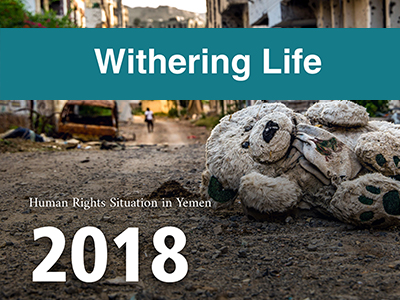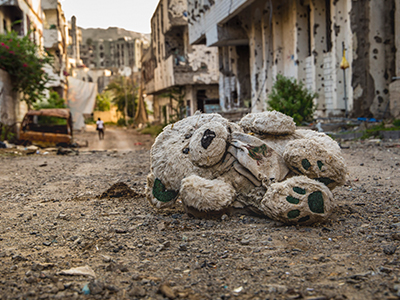Executive Summary
This report, Withering Life, documents violations of international human rights law and international humanitarian law committed by the parties to the conflict in Yemen during 2018. Mwatana conducted field investigative research in 20 governorates in Yemen, and conducted at least 2065 interviews in Arabic with victims, their relatives, eyewitnesses, and individuals working in the medical and humanitarian fields. This is Mwatana for Human Rights second annual report. It is made up of three main parts, including:
Part 1: The Conflict in Yemen Under International Law
This part of the report addresses the conflict in Yemen under international law. During the conflict, international humanitarian law provides protection to civilians and other noncombatants from the effects of war. During 2018, Mwatana documented repeated attacks by the parties to the conflict that did not adhere to the basic principles of the laws of war, like civilian immunity and distinction. International human rights law remains in effect during armed conflicts.
Part 2: Patterns of Violations and Abuses in 2018
During 2018, the warring parties’ violations and abuses continued, undermining civilian life.
Airstrikes and shelling continued to kill and wound civilians in indiscriminate and disproportionate attacks. The laying of anti-personnel mines continued, as did the recruitment and exploitation of children in various forms. Incidents of sexual violence started to surface.
People have been detained and tried in court for their religious beliefs, and others have been detained because of their journalism. Parties to the conflict have detained civilians from areas under the control of the opposing side, or because of their surnames or because they were from certain families. Detentions for lengthy periods without trial or clear charges continued. A number of detainees were forcibly disappeared and tortured, leading, in some cases, to their death. While the majority of victims of detention-related abuses were men, women have also been detained, mistreated, and sentenced to death following unfair trials.
Schools, hospitals, healthcare facilities, and medical personnel were attacked by both sides to the conflict, including in aerial and ground attacks. Some schools were used for military purposes.
The parties to the conflict used starvation as a weapon of war. They impeded or blocked humanitarian supplies, while simultaneously continuing practices that limited the ability of civilians to move freely between different parts of the country—not only at the frontlines, but also within areas under the control of one side. Security checkpoints continue to screen travelers, including discriminating based on their identity.
During the war, Yemen has witnessed the spread of different forms of oppression and violence against those seeking to gather and peacefully protest. Freedom of expression has been significantly curtailed, and the media has been subjected to different forms of attack, ranging from arbitrary detentions, enforced disappearance, physical assaults and humiliating treatment, to the raiding and burning of media institutions. Human rights work, or defending of public freedoms has become very dangerous, with those working in the field of human rights repeatedly subject to attack.
The United States drone strikes in Yemen continued, killing and wounding civilians.
The chapters in this part of the report are divided as follows:
Section 1: Airstrikes
In 2018, Mwatana documented at least 150 airstrikes against civilians or civilian objects conducted by the Saudi/UAE-led Coalition in 11 governorates in Yemen. These governorates included Hajjah, Sa’ada, Al Hudaydah, Al Jawf, The Capital Secretariat (Sana’a), Al Bayda, Taizz, Amran, Ibb, Sana’a governorate and Lahj. The attacks killed at least 375 civilians, including 165 children and 50 women, and wounded 427 others, including 172 children and 55 women.
Section 2: Indiscriminate Ground Attacks
In 2018, Mwatana documented 87 indiscriminate ground attacks that killed at least 124 civilians, including 6 women and 52 children, and wounded at least 284 others, including 35 women and 120 children. These attacks occurred in eight Yemeni governorates: Hudaydah, Taizz, Sa’ada, Lahj, Hajjah, Al Jawf, Aden, and Marib. The armed group Ansar Allah (Houthis) was responsible for 49 of the attacks, while forces loyal to the Coalition and President Abd Rabboh Mansour Hadi were responsible for the 26 other attacks documented. The joint responsibility for 5 incidents lies with Ansar Allah (Houthis) and forces loyal to President Hadi, while a “Mwatana” has not been able to identify the violator of 7 other incidents.
Section 3: Landmines
Mwatana documented about 52 cases of landmines exploding in 2018 in Hudaydah, Al Jawf, Taizz, Lahj, Shabwah, Al Bayda, Hajjah, Saada, Hudaydah and Marib governorates, killing at least 60 civilians, including eight women and 26 children, and wounding at least 51 others, including 12 women and 21 children. The armed group Ansar Allah (Houthis) was responsible for at least 49 of these cases. Mwatana was unable to identify the violator in three incidents.
Section 4: Recruitment and Use of Child Soldiers
Mwatana documented at least 1117 children recruited or used for military purposes in 2018, through 689 observations and interviews. Of the children Mwatana identified, 72% were recruited or used by Ansar Allah (Houthis), with cases primarily in Sana’a, Sa’ada, Hudaydah, Al Jawf, and Hajjah governorates. Emirati proxy forces (the Security Belt Forces and Hadhrami Elite Forces) were responsible for 17% of cases, in Abyan, Lahj, Aden, and Hadramaut governorates. Forces loyal to President Hadi and affiliated “popular resistance” groups were responsible for 11% of the cases, in Al Bayda, Al Dhale, Hudaydah, and Abyan governorates. Extremist groups recruited and used two children in Al Bayda and Hadramaut governorates.
Section 5: Arbitrary Detention
During 2018, Mwatana for Human Rights documented at least 224 arbitrary detentions. Ansar Allah (Houthis) was responsible for at least 132 cases in 11 governorates (Ibb, Taizz, the Capital Secretariat (Sana’a), Hajjah, Sa’ada, Amran, Hudaydah, Sana’a, Dhamar, Al Mahwit, and Al Bayda). Forces loyal to President Hadi and the “Popular Resistance” were responsible for 59 incidents in the governorates of Marib, Taizz, Al Jawf, and Hadramaut. The Security Belt Forces and the Hadhrami Elite Forces (proxy Emirati forces) and the Special Forces, Counter-Terrorism Forces, Emergency Forces, security agencies, and the forces of the Support and Assistance Brigades were responsible for 33 cases in the governorates of Aden, Lahj, Shabwah, Abyan, and Hadramaut.
Section 6: Enforced Disappearance
During 2018, Mwatana documented at least 203 enforced disappearances, including at least 112 incidents that occurred in areas under the control of armed groups loyal to the The Saudi/UAE-led coalition and President Abd Rabboh Mansour Hadi, in the governorates of Aden, Al Jawf, Taizz, and Marib. 91 other disappearances took place in areas under the control of Ansar Allah (Houthis) in the governorates of Hudaydah, Taizz, Sana’a, Ibb, and Hajjah.
Section 7: Torture
Mwatana documented 62 torture cases in 2018, including at least 45 committed by the Security Belt Forces and Hadhrami and Shabwani Elite Forces (proxy Emirati forces) and forces loyal to President Hadi in Abyan, Shabwah, Taizz, Aden, and Hadramaut governorates. Mwatana documented the torture of 11 fishermen, one a child, in the city of Jazan in Saudi Arabia, after they were stopped and taken from the coast of Midi in Hajjah governorate. Four people died as a result of torture, Ansar Allah (Houthis) group bears responsibility for the deaths of two victims in Al Hudaydah governorate, while forces loyal to President Hadi and proxy Emirati forces hold responsibility for the deaths of other two victims in Taizz and Shabwah governorates.
Ansar Allah (Houthis) committed at least 17 in Sana’a Taizz, Hudaydah, Ibb, and Sa’ada governorates.
Section 8: Sexual Violence
Mwatana for Human Rights documented seven cases of sexual violence against 8 children in 2018. Forces loyal to the Saudi/UAE-led Coalition and President Hadi were responsible in sexual violence against 6 children, while Ansar Allah (Houthis) responsible in sexual violence against 2 children.
Section 9: Attacks on Schools
In 2018, Mwatana documented at least 60 attacks on or use of schools by the parties to the conflict, including two airstrikes, 22 cases of schools occupied, and 36 cases of other forms of schools used for military purposes. Ansar Allah (Houthis) were responsible for 52 of these incidents, while the Saudi/UAE-led Coalition and forces loyal to the Coalition and President Hadi (like the Giants Brigades (Al Amaliqah), the forces of the 22nd Mechanized Brigade, the forces of the 17th Infantry Brigade, the forces of the 35th Armored Brigade, and the Abu Al Abbas Brigades or the “Popular Resistance”) were responsible for eight other incidents.
Section 10: Attacks on Hospitals
During 2018, Mwatana for Human Rights documented 16 attacks on hospitals, healthcare centers, and medical personnel. Ansar Allah (Houthis) were responsible for four incidents in the governorates of Taizz and Ibb, While the Popular Resistance “Abu Abbas Brigades” and the armed group of the 62nd Brigade are responsible for 7 incidents in Taizz governorate, while Al-Qaeda in the Arabian Peninsula (AQAP) bears responsibility for one incident, while “Al-Qaeda in the Arabian Peninsula” and ” Abu Abbas Brigades” bear joint responsibility for Another incident in Taizz governorate. The Saudi/UAE-led Coalition is responsible for two incidents in the governorates of The Capital Secretariat (Sana’a) and Hajjah. “Mwatana” was unable to identify the violator in one incident in Al Hudaydah.
Section 11: Blocking Humanitarian Supplies
Mwatana documented 74 incidents of obstructing humanitarian access and humanitarian supplies in 2018. Ansar Allah (Houthis) were responsible for 62 of these incidents in the governorates of Al Mahwit, Sa’dah, Al Hudaydah, Dhamar, Ibb, Al Jawf, and Raymah. The “Popular Resistance” forces and forces loyal to President Hadi were responsible for 6 incidents in the governorates of Sa’dah and Hajjah, while the Saudi/UAE-led Coalition was responsible for 6 incidents in the governorates of Sa’dah and Hajjah.
Section 12: Drone Attacks by U.S. Forces
Mwatana documented six apparent US drone strikes in 2018 that killed at least 17 civilians. Four others, including a child, and an additional child wounded, appeared to have registered in the US-aligned Yemeni army, although some did not appear to be participating in the current conflict and may have been civilians at the time of the attack. One apparent member of AQAP was wounded. The attacks occurred in Shabwa, Al Baydha, and Al Jawf governorates. Mwatana conducted more than 15 interviews with victims, relatives, and witnesses from the areas where attacks occurred, as well as conducted site visits and analyzed weapons remnants.
Part 3: Undermining Rights and Freedoms
This part includes four sections, including:
Section 1: The Press
Mwatana documented eight incidents of violations against 27 journalists and media organizations in 2018. Ansar Allah (Houthis) were responsible for five, including detaining 3 journalists and disappearing two, while three incidents occurred in areas under President Hadi’s authority.
Section 2: Peaceful Assembly
In 2018, Mwatana documented three instances where Yemeni civilians making demands sought to use peaceful assembly and protest but faced oppression and new methods of abuse in response. Two incidents took place in the capital, Sana’a, and one in the city of Mukalla in southeastern Yemen.
Section 3: Religious Minorities
Mwatana documented two arbitrary detentions carried out by Ansar Allah (Houthis) in 2018, apparently related to the individuals’ religious beliefs: the detention of Abdullah Al Olofi, a member of the Bahá’í community, and the detention of Yusuf Saeed Al Na’idhi, a Yemeni Jewish man.
Section 4: Movement
In 2018, Mwatana has documented 10 incidents on civilian’s freedom of movement, including restrictions on movement inside the country imposed by Ansar Allah (Houthis), forces and groups loyal to the Hadi government and the Saudi/UAE-led Coalition, and armed groups affiliated with the Southern Transitional Council, as well as movement outside the country imposed by the Coalition on Yemen’s various airports and border crossings. People’s ability to move freely inside and outside Yemen has decreased dramatically throughout the conflict, with an enormous impact on civilians and civilian life


